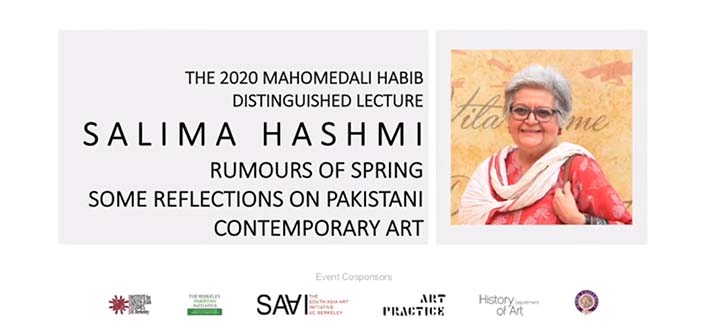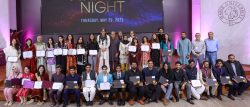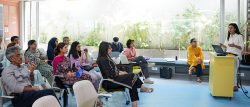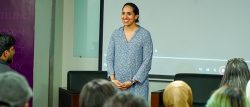Salima Hashmi, an eminent artist, curator and contemporary art historian spoke on the state of art in Pakistan.
The 8th Mahomedali Habib Lecture was hosted as an online Zoom event, due to the uncertain times brought about by COVID-19 pandemic. The lecture series is a collaboration between Institute for South Asia Studies at University of California Berkeley and Habib University. Titled “Rumors of Spring: Some Reflections on Pakistani Contemporary Art”, the lecture was delivered by the eclectic Pakistani art historian, artist and curator Salima Hashmi.
Dr. Munis D. Faruqui, Director of Institute for South Asia Studies, hosted the event. He remarked at the uncertainty of the times but remained steadfast in stating the cataclysmic mission of the Mahomedali Habib Lecture series in advancing the intellectual pursuit of institutes such as UC Berkeley.
In his opening remarks, Mr. Wasif Rizvi, President, Habib University acknowledged Dr. Faruqui for his Pakistan-focused vision in initiating the collaborative lecture series between two universities. He fondly remembered two enthusiastic friends and supporters of this lecture series. The late Ali Suleman Habib, founding member of the Board of Governors, Habib University and scholar and professor Saba Mehmood.
Highlighting the Pakistani higher education experience, Mr. Rizvi addressed some of the challenges faced by Pakistani students such as the absence of an “independent view of their own literature, their own art, of their own thought, of their own social structures… from the point of view of their own civilization”. Placing Habib University at the forefront of rehabilitating higher education, President Wasif Rizvi thanked the founding faculty of the University for pioneering Habib University’s intellectual student experience.
The lecture began with Salima Hashmi reciting the opening couplet of a poem by Faiz Ahmed Faiz from which the title of lecture; “Rumors of Spring” is borrowed. She went on to comment on the importance of artists and their work especially as emerging artists from an increasingly unsettling Pakistan continued to make waves globally. She said, “It is artists, like poets who confront our checkered times with passion born of love and courage”. She then went on to dissect each distinctive art piece and presented the viewers with a confluence of possibilities behind each piece. Though she agreed that art is not meant to be explained, there are artists whose work may “stun us into silence”. For example, a site-specific installation by Imran Qureshi titled, “Blessings Upon the Land of my Love” details the beauty that may emerge out of an unsettling carnage.
“I think this kind of ambiguity or double meanings are something that artists have learned to live with because it is a mode of survival”, remarked Salima Hashmi. In the post-lecture discussion, Nauman Naqvi, Associate Professor, Habib University also commented on the ambiguity and potentiality of art. He referred to art as being a means of coming to terms with our past but also as a medium which allows us to hope.
Also included in this session were Atréyēē Gupta, (Assistant Professor, Global Modern Art and Southeast Asian Art,) and Asma Kazmi, (Assistant Professor, Performance Art), at UC Berkeley.
Later, Asma Kazmi led the Q&A session and entertained questions from the viewers. Pertinent questions included the implications of radical Pakistani art being created in national institutions and its possible limitations. In responding to this, Salima Hashmi expressed her concern about the ever-growing avenues which seek to stifle and limit expression in Pakistan specifically and generally in South Asia. Yet she hoped for South Asian art to flourish through the creation of expansive networking and seeking of collaborative efforts.
The Mahomedali Habib Lecture, held annually, is named after one of the leading figures of the Habib family, and aims to encourage discourse on Pakistan and provides opportunities for scholars to engage in dialogue.




